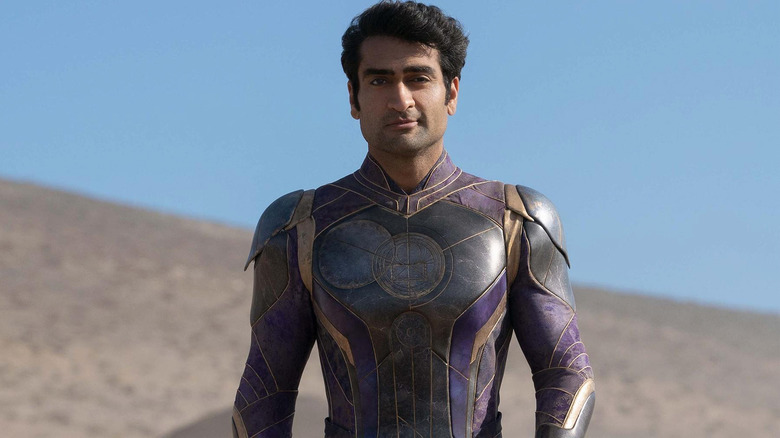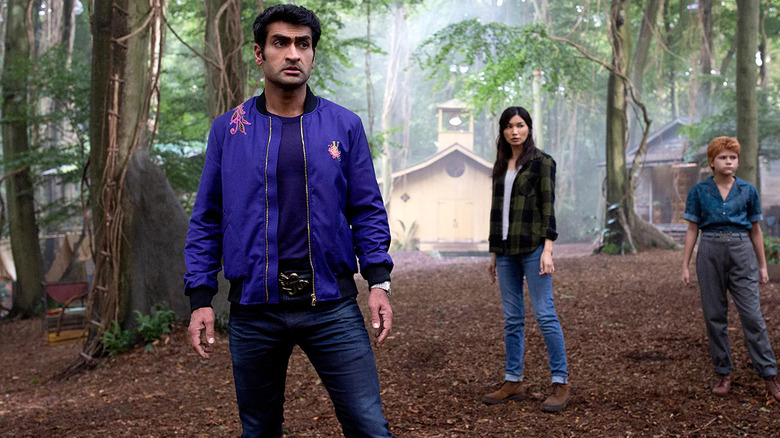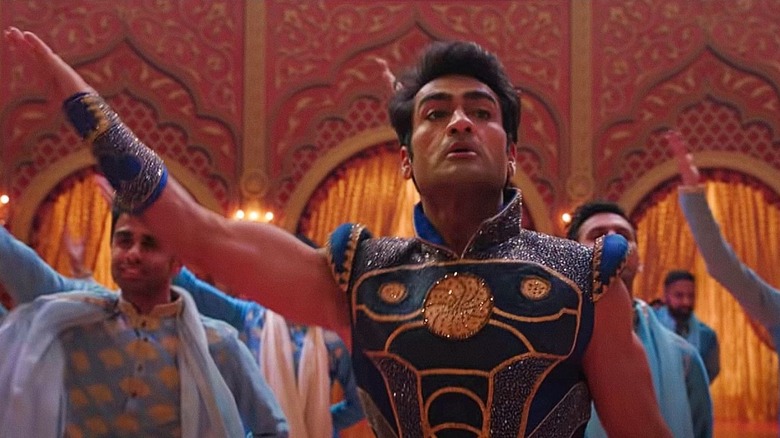Eternals Star Kumail Nanjiani Feels Conflicted About Changing His Body To Play A Superhero
Superhero movies have a tendency to come with a lot of built-in expectations and pressures, many of which can be unfair or even downright cruel to the cast and crew. One such aspect that audiences have a habit of taking for granted has to do with the physical expectations we've come to demand from actors portraying these larger-than-life characters. The toxicity that stems from unrealistic body standards is obviously something that women deal with on an often daily basis and is an issue that has loomed large with past castings of, say, Wonder Woman or Captain Marvel. Though perhaps to a lesser degree, comparatively unreasonable standards are foisted upon men when it comes to getting into "superhero shape," and it's indicative of a much larger societal trend.
This issue came back to the forefront of many online discussions when Kumail Nanjiani was first revealed in character for Marvel's "Eternals." Now, the actor is weighing in with his own complicated feelings about his dramatic body transformation.
No Easy Answers
Remember when Kumail Nanjiani first posted that Instagram picture showing off his new look for "Eternals?" That was probably the earliest instance where the actor, known primarily for his stand-up comedy, co-writing and starring in "The Big Sick," and starring in "Silicon Valley," found himself becoming a lightning rod of sorts concerning the frankly alarming body standards that Marvel has helped normalize.
There are several complex parts to that discussion, such as the undeniably racially-tinged body-shaming thrown Nanjiani's way for simply doing what his white co-stars have done since the MCU's inception. But there's also the equally hard-to-ignore fact that the process of getting in shape to such an extreme extent is both unhealthy — intentional dehydration is a common way to achieve the "washboard abs" look — and further reinforces the "ideal" standard that men (and especially South Asian men) are conditioned to internalize.
In a profile with GQ, Nanjiani is well aware of this overarching conversation and his own place within it. "I've found out over the last year and a half, since I did that picture, that I am very uncomfortable talking about my body — and it's become less and less and less comfortable." Though he goes out of his way to take ownership of that fact that he chose to make this change to his body, the actor also admits that this "upset" his "Eternals" director Chloé Zhao, who adds her own perspective that she simply "...wanted to make sure he didn't feel like he had to do it for me." Alluding to his responsibility of adding long-overdue representation to the Marvel franchise and his character's disguise as a Bollywood star (who are usually depicted as musclebound action heroes), Nanjiani says:
"If I'm playing the first South Asian superhero, I want to look like someone who can take on Thor or Captain America, or any of those people.
From the '60s to the '90s I know basically every big [Bollywood star]. I was like, I want this to be believable. I want to feel that kind of powerful in this role."
"The Male Ideal"
On top of everything else, the intense racial aspect of this conversation cannot be overlooked. The Bollywood angle in "Eternals" is one that I personally still have a few reservations about, especially when Nanjiani has previously gone on record about wanting to stay away from "Brown dude" stereotypes. That said, it's easy to see that he was in the unenviable position of being caught in a no-win situation regardless of how he presented himself.
That extends even more broadly to how his appearance in "Eternals" may unwittingly perpetuate a certain negative self-perception among young men. It's no secret that many social and political problems in recent years can be traced back to the scourge of predominantly male anger and entitlement. Though this obviously can't be put at the feet of any one public figure, Nanjiani articulates how his appearance goes hand-in-hand with a particular mindset that is brought out among men who share a similar body type as him:
"It is aggression. It is anger. A lot of times we are taught to be useful by using physical strength or our brain in an aggressive, competitive way. Not in an empathetic way. Not in an open, collaborative way. It's the same thing when you have all these guys, like, asking people to debate them on Twitter. That's the same as arm wrestling. It's about defeating. And that's what the male ideal has been. Dominating. Defeating. Crushing. Killing. Destroying. That's what being jacked is."
The rest of the interview is well worth reading, even if much of these troubling issues remain unresolved. But the conversation has to start somewhere, and this certainly seems like a good first step.
"Eternals" arrives in theaters on November 5, 2021.


